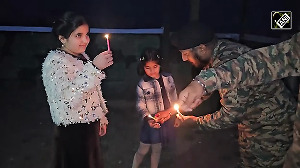Warning that the Al Qaeda wants a nuclear weapon not to build a stockpile but to use it, a senior US official has said that the terror group will use only a handful number of operatives to carry out the attack, just as they did during the 9/11 strikes.
"Our post-9/11 successes against the Taliban in Afghanistan yielded volumes of information that completely changed our view of Al Qaeda's nuclear programme. We learned that Al Qaeda wants a weapon to use, not a weapon to sustain and build a stockpile," Under Secretary for Intelligence and Analysis Charles Allen told lawmakers.
"Al-Qaeda thinks and plans dynamically, and they rarely follow straightforward, linear paths to their targets. We need to be just as flexible and dynamic in our response," Director in the Office of Intelligence and Counter- Intelligence in the Department of Energy Rolf Mowatt-Larssen told lawmakers.
He warned that an Al-Qaeda nuclear attack would be in the planning stages at the same time as several other plots, and only the most senior leadership of the terrorist outfit will know which plot will be approved.
"In keeping with Al Qaeda's normal management structures, such as the role of Khalid Sheikh Muhammad in the 9/11 attacks, there is probably a single individual in charge, overseeing the effort to obtain materials and expertise," Mowatt-Larssen said.
Allen was at the Senate Committee on Homeland Security and Governmental Affairs, headed by Senator Joseph Lieberman, when he said that some experts may have joined Al Qaeda years ago, long before the world began paying adequate attention to the proliferation of the kinds of technologies that could yield a nuclear weapon.
"The 9/11 plot was operationally very straightforward. It had a very small footprint, was highly compartmented. Al Qaeda's nuclear effort would be just as compartmented and probably would not require the involvement of more than a small number of operatives," Allen said.
"The task for the intelligence community is not easy. We must find something that is tactical in size but strategic in impact. We must find a plot with networks that cut across traditional lines of counter proliferation and counter terrorism. We must stop something from happening that we have never seen happen before," a top intelligence official said.
"We do not know what a terrorist plot might look like. There is, however, a choke point in a terrorist effort to develop a nuclear capability. It is impossible to build a nuclear weapon without fissile material," Allen told lawmakers.
"A state has the time and resources to build a large infrastructure required to make nuclear material. A terrorist group needs only to steal or buy it. A terrorist group does not need this kind of surety and consistency that a state desires. A terrorist group needs only to produce a nuclear yield once to change history," he said.
"The nuclear threats that surfaced in June 2002 and continued through the fall of 2003 demonstrated that Al Qaeda's desire for a nuclear capability may have survived their removal from their Afghanistan safe haven," Allen added.





